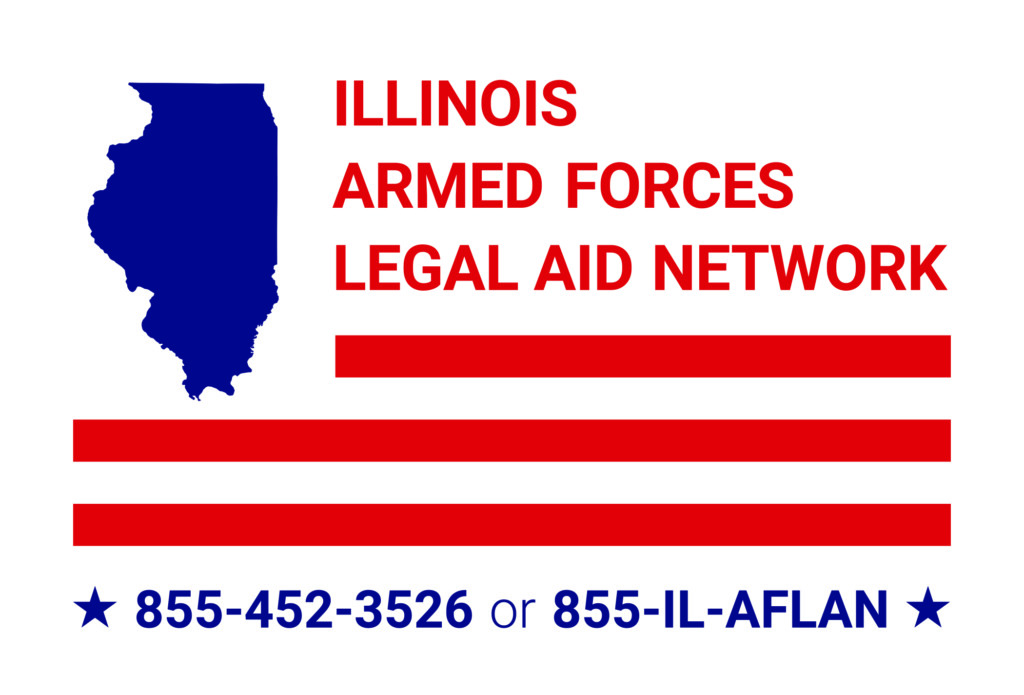By Nicole NeSmith, CARPLS Development & Communications Associate
The Illinois Armed Forces Legal Aid Network (IL-AFLAN) was created by the State of Illinois to provide wide-scale civil legal aid to veterans, military service members and their families. Veterans face some of the toughest challenges in navigating the justice system to protect their livelihoods, health, housing and families.
In Illinois alone, there are nearly 800,000 veterans and military service members and an additional 20,000+ dependents (of service members who were deployed between 9/11/01- 5/31/15, according to Ilaflan.org). There is simply a great need to bridge these groups through legal aid, and IL-AFLAN aims to accomplish this.
Consider Bob, a veteran who lives in central Illinois and is very active at his VFW (the Veterans of Foreign Wars) post. He had a boarder in his house, but the living situation became difficult and unsafe for Bob. The boarder was threatening him and banging on his door at night. He called the IL-AFLAN hotline for legal advice on how to evict the boarder conscientiously. Steve Prout, a CARPLS Staff Attorney on the IL-AFLAN hotline, talked him through the steps over the course of about six months. “He successfully filed an eviction lawsuit and had the tenant leave the house,” Steve says. “We also helped him when the tenant left behind personal property. He got his life back to normal and now has peace of mind.”
Though not all stories turn out so well, IL-AFLAN attorneys do everything they can to search for a solution. Really, IL-AFLAN may be the best kept secret in legal aid.
The Partner Network
Understanding how IL-AFLAN works is like looking at a hub and its spokes, notes Steve. When a client calls in for a civil legal issue, anywhere in Illinois, they are first directed to the CARPLS IL-AFLAN hotline and are immediately in conversation with an attorney.
IL-AFLAN has two distinct but connected components: the hotline and what goes on behind the scenes with the network.
“CARPLS is indeed the hub of IL-AFLAN,” remarks Zach Zarnow, Program Director for IL-AFLAN. “They are the driver of efficiencies with a very high level of service and speed but with low cost. Their knowledge management system, with legal solutions at their fingertips so that the attorneys can give advice quickly, really helps them assess what the client needs or who they need to be referred to.”
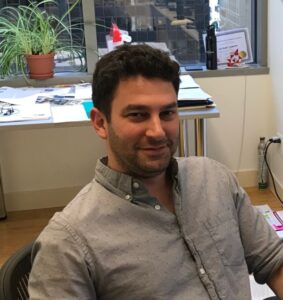
CARPLS designed the online portal (called the Partner Community) to make the referral process seamless and to ensure that no client is dropped between referrals. “We can better track the success of our referrals and outcomes of their legal cases—and make services better and the justice system more fair and accessible,” says Al Schwartz, CARPLS Executive Director. “IL-AFLAN provides a continuum of care for veterans that hasn’t really existed prior to this—instead many vets encountered siloed services which can be very frustrating. We believe in accountability, transparency, a better client experience, and working together as one.”
When one of the now 18 other partners can’t take a referral, CARPLS’ IL-AFLAN attorneys work to find another solution. “We don’t give up or stop having those conversations until we’ve exhausted our options,” says Karla Chrobak, IL-AFLAN Supervising Attorney.
Part of IL-AFLAN’s impact is its geographic scope.
“It’s not just Cook County—it’s all of Illinois,” says Steve. “We get a great diversity of locations. What that means in my experience is that the issues are very comparable throughout the state, but then you see specific military issues that are completely unique to IL-AFLAN.”
People tend to call more than once, and there are many cases where clients need more than one service, like for divorce drafting. With civil legal aid, the most common cases involve housing, family law and consumer issues. On the IL-AFLAN hotline, however, you also see more specialized areas such as VA benefits and military discharge upgrades.
While many of the callers are veterans, the IL-AFLAN hotline gets a number of active duty military service members, too. “They are often calling because they’re on the throes of a deployment and they’re concerned about getting some of their financial affairs in order or about other family issues that need to be addressed before they deploy,” Steve says. IL-AFLAN also receives many calls from people referred by their military attorneys on bases. “That demonstrates to me that the word has gotten out about IL-AFLAN and that we’re good at what we do.”
CARPLS acts as the front line for all calls and connects cases to the more specified network programs. The UIC John Marshall Law School (JMLS) Veterans Legal Clinic, for example, focuses on veterans’ benefits and discharge upgrade cases.

“Before we joined IL-AFLAN, we were taking in our own cases and were receiving so many phone calls and emails that didn’t fit within our clinic,” says Jillian Berner, Senior Staff Attorney at the JMLS clinic. “It took up a lot of time and bandwidth. CARPLS has been a huge help. Most of the new cases come from CARPLS after they’ve been pre-screened. Having the ability to outsource that to IL-AFLAN and CARPLS has been really helpful and has narrowed down the cases to things we can actually help with.”
Anne Dunbar, Project Manager for the Veterans Legal Assistance Project at Prairie State Legal Services (PSLS), notes that CARPLS refers cases to PSLS for consideration, and they routinely refer clients to CARPLS through the online portal if they cannot assist or if they have a legal issues that are not within their scope of practice, such as veterans’ benefits.
“I think our organizations work extremely well together, and communicate easily and efficiently, because we have a mutual interest in providing high quality legal assistance to the veteran community,” Anne says.
Elizabeth Boe, Managing Attorney with the Public Interest Law Initiative (PILI), also has observed this great “network of support.” “We are pro bono-based, so not all cases will make sense for us. Some of our attorneys are very well-versed and some are new to family law, and there is a great need for family law in IL-AFLAN and legal aid in general. Karla at CARPLS does a great job matching cases that suit our volunteers’ abilities and what’s best for the clients. This great work from CARPLS helps us maintain and grow our volunteer base.”
The Origin Story
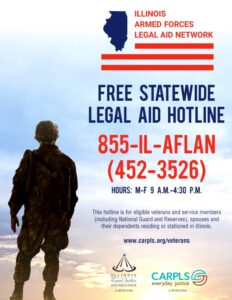
IL-AFLAN debuted to the public in 2017 as the nation’s first statewide veteran’s hotline and partner network. However, there was some diligent leg work to get to that point.
The Illinois Equal Justice Foundation (IEJF) was charged with implementing Public Act 99-0281, an amendment to the Access to Justice Act (2013). The Act created the Illinois Access to Civil Justice Council, with the mandate to create a pilot statewide legal assistance hotline and coordinated network of legal support services for military personnel, veterans, and their families. This effort is funded by a $2 filing fee on all civil filings until 2020 (ilaflan.org). This bill passed during a truly contentious time for the State budget, but many people worked diligently to make this a priority to help veterans.
The initial idea for IL-AFLAN is not ascribed to one person—it was a group effort led by the Chicago Bar Foundation, the Administrative Office of the Illinois Court’s Civil Justice Division, the Illinois Department of Veterans’ Affairs, and the IEJF. What started out as a general discussion about helping those in need turned into a project for veterans.
“We wanted to build something that really made an impact,” said Zach. “We had a chance to make something meaningful.”
But they also knew not to rush the process. “In our early conversations, we hadn’t nailed everything down, but we knew that having one phone number would be best.” Zach then embarked on a year-long listening tour and needs assessment. He wanted to find out who was serving veterans, who wasn’t, and who didn’t know. He talked to over 100 people around the state.
“We didn’t want to replicate the mistakes that took place during the time that was called ‘the sea of goodwill,’” Zach says. “After 9/11, many veterans and service members felt like there were so many people and organizations who told them they wanted to help but either couldn’t follow through or didn’t know what they were doing. We didn’t want to be a program that made promises we couldn’t keep.”
After doing a soft launch in late 2016, they didn’t publicize IL-AFLAN’s number or information for the first five months. IL-AFLAN members attended stand downs and, most importantly, asked a lot of questions. IEJF did mailings to all the Illinois State Representatives and met with people at various foundations to gain insights and expertise. In 2017, IL-AFLAN formally launched with nine partner organizations, including CARPLS as the hotline hub.
“We had the unique opportunity as a network to help build the statewide program from the ground up,” Anne said.
CARPLS staff members joined IL-AFLAN for myriad reasons but some were exceedingly personal.
“I expressed a desire to work for IL-AFLAN, because I have experience working with veterans and wanted to provide services for a veteran-specific project,” Dennis Trainor, Staff Attorney, says.
“I’m an Army brat from all the way through high school and am an Army veteran myself, so I knew I could relate to the callers,” Steve says.
“Veterans run in my family,” Karla says. “My husband was in the Marine Corps Reserve, my uncle was a Korean War veteran, and the U.S. military liberated my mom’s city, Strakonice, in the former Czech Republic, in WWII.”
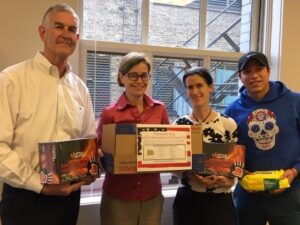
“I wanted to work on IL-AFLAN because it was a new challenge but also because veterans have a soft spot in my heart,” says Kenny, the only CARPLS paralegal on the IL-AFLAN team. “I have a family member that passed
away because he didn’t receive the assistance he needed. I knew the IL-AFLAN hotline would give us a chance to get to at least some of those veterans.”
It’s All About The Clients
Mary Jo Rosso, CARPLS IL-AFLAN Staff Attorney, says part of the impact of IL-AFLAN is helping those who have been lost for quite some time. “Often people come to us with issues that have been unaddressed for many years and compounded upon themselves. Some have mental health issues that make follow through difficult and have prevented them from getting service from other resources in the past.”
It’s all about building trust. Kenny has spoken to just about every IL-AFLAN client that has called back. “I’m able to develop more of a connection with the clients. Many of them I can tell who they are by the sound of their voice. They feel more comfortable talking to me and I can handle a lot more of their issues without having to transfer them because they feel like they can trust me.”
While the purpose of IL-AFLAN is to provide legal assistance to veterans, service members and their families, Kenny has learned that the scope of our services go beyond the basic description. “Veterans thank us all the time for listening to them and not just brushing them away. Sometimes there is no legal recourse left, but they feel much better after speaking to someone.”
It’s not unusual for clients to show their gratitude for our services. Our network gets stronger every day, which allows us to make more and more personal connections to our clients.
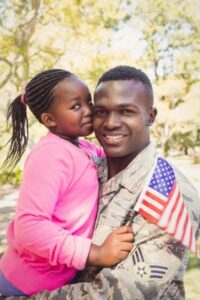
For some attorneys, the connection is being a “brother or sister in arms,” says Ed Farmer, CARPLS IL-AFLAN Staff Attorney. “When clients call the hotline and learn that I am a fellow veteran, in their eyes, it gives me instant credibility. This trust allows them to open up more to me about their legal issue than they would with a non-veteran. This gives me the details I need to better assist them.”
Kenny says it’s easy to unexpectedly connect to clients. He once worked with an elderly client who was being harassed with an eviction due to clutter in his apartment. He had a bad hip, so it was hard for him to move around. CARPLS helped him get more time to clean out the unit and drafted a letter for ADA (Americans with Disabilities Act) accommodations. The landlord stopped harassing the client. “This guy called me just about every day, only wanting to speak to me. And even after I gave him advice, he would call to ask how I was doing.”
Mary Jo remembers connecting to Larry who was in foreclosure. She directed Larry to some resources within the IL-AFLAN network and provided encouragement. While his issues weren’t fully addressed, he had a plan on how to address them after speaking with us. It was a fairly standard call, but then Larry said though he hadn’t fully solved his problem in that call, it was the most respect he’d received in a great while. “His kind words lifted my spirits during a difficult time in my life,” she said. “I think he helped me as much as I helped him.”
More Than Legal Advice
Though helping and guiding is a big part of the network, we also aim to partner with clients as they try to navigate the justice system and learn to advocate for themselves. This common relationship among clients, attorneys, paralegals and everyone in our partner network is a great way to describe IL-AFLAN.
The statewide program has also made huge strides in the “fluidity of how the hotline works,” Kenny says. Many of our attorneys have remarked at the efficiency of our referrals, the partner response time, and the increase in the volume of calls.
“It’s a lot different and more successful than what people expected it to be,” says Karla. “We’re getting to a lot of people around the State. They’re getting heard. There’s something to be said about hearing a lawyer on the other end when you call in.”
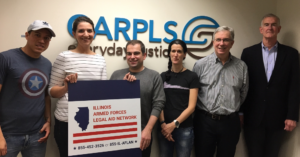
Zach notes the organization has since grown from nine partner organization to 19, many of whom are volunteer based without funding. IL-AFLAN is open to adding further organizations, but it’s a selective process. “We’re not going to take just anyone. You need to know what you’re doing, like CARPLS,” Zach says. “People ask me all the time how they can start their own IL-AFLAN, and I tell them it will be really difficult to replicate without their own CARPLS.”
Building For The Future
The McCormick Foundation recently granted $250,000 to IEJF in support of IL-AFLAN. The State of Illinois is a pioneer through this program. With continued support and growth, Karla thinks the long-term goal for IL-AFLAN is a nationwide presence. “That would be my vision for what happens, eventually. We could do it.”
Our Executive Director, Al, agrees that IL-AFLAN is a “model for the legal community to adapt down the road and makes the services better and more customized for the clients.”
For Zach, the main goal will be this focus on client customization. “IL-AFLAN is a great coalition of people. We have the ability to service clients holistically. When we can map out resources, veteran and service member locations, income, populations, we will be able to layer in more legal and social services.”
Jillian from JMLS agrees that the future of legal aid is a deeper connection with social services. “We have a lot of veterans who don’t necessarily need legal services but desperately need social services that aren’t accessible to them. Having more insights into other programs out there focused on education, financial literacy, activities, social support, will mean that clients will have a more comprehensive experience.”
And, to do this, we need more attorneys and more awareness of IL-AFLAN. We are looking for your assistance to promote this important program. With your help, we can serve more veterans, service members, and their families in 2020.
You can reach our IL-AFLAN hotline at 855-452-3526 from 9 a.m. – 4:30 p.m. Monday through Friday. For more details, visit www.ilaflan.org.
